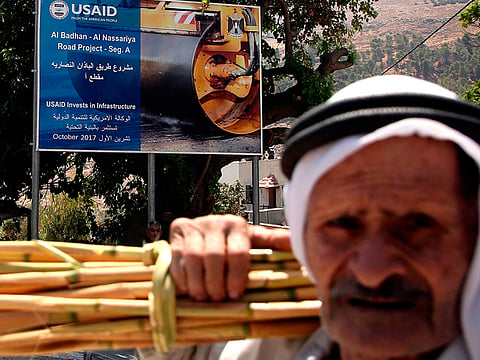Trump slashes humanitarian aid to Palestinians
US to withhold more than $200m allocated in 2017 budget

WASHINGTON: The Trump administration intensified its hostile stance toward the Palestinian National Authority on Friday, announcing that it would withhold more than $200 million (Dh734 million) in humanitarian aid that had been allocated for Palestinians in the 2017 budget year.
The announcement, made through a senior official at the State Department, followed a separate action this year to freeze $120 million in aid to the United Nations refugee agency that works with Palestinians.
The $200 million withheld on Friday had been intended to pay for a variety of humanitarian projects in the West Bank and Gaza Strip.
A State Department official said the only other direct money sent to the Palestinian National Authority from the 2017 allocation was $61 million for security assistance and anti-terrorism-related programmes in the West Bank.
The US also previously sent $60 million through the United Nations for refugee assistance that benefited, in part, the West Bank and Gaza.
Trump threatened to end most US aid in January, blaming Palestinians for the failure of the peace process with Israel. Negotiations to resolve the conflict broke down years ago and neither side has shown interest in resuming talks.
“(W) e pay the Palestinians HUNDREDS OF MILLIONS OF DOLLARS a year and get no appreciation or respect,” Trump said on Twitter. “(W) ith the Palestinians no longer willing to talk peace, why should we make any of these massive future payments to them?”
Palestinians have resisted Trump’s effort to pressure them into making a deal, saying his administration is so unabashedly supportive of Israel it can’t be an honest broker.
The State Department’s announcement said it had reviewed the aid at Trump’s request and determined that the money would be better spent elsewhere.
“This decision takes into account the challenges the international community faces in providing assistance in Gaza, where Hamas control endangers the lives of Gaza’s citizens and degrades an already dire humanitarian and economic situation,” the State Department official wrote.
The administration had already upset Palestinians, Arab and European allies and others with its decision last year to recognise Jerusalem as Israel’s capital and to back away from supporting a two-state solution, which had long been US policy.
The moves have pushed US policy further toward Israel than it has been under most administrations, which had tried to present themselves as more even-handed in the long-standing conflict, even as they maintained Israel as a close ally.
A long-promised peace initiative led by Trump’s son-in-law, Jared Kushner, and Trump’s longtime attorney, Jason Greenblatt, has yet to materialise.
“This is just the latest move by this administration to cruelly punish Palestinian civilians and marginalise and undercut Palestinian leadership,” said Dylan Williams, vice-president of government affairs for J Street, a liberal Jewish group that advocates a peaceful solution to the Israeli-Palestinian conflict.
“These cuts will undermine Israel’s security by exacerbating Gaza’s humanitarian crisis and further destabilising the difficult situation in the West Bank — increasing the prospects for violence and unrest.”


